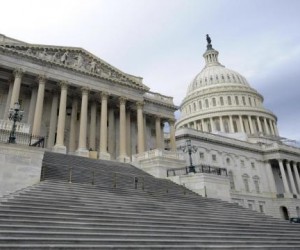
By Joe Davidson
Even with a freeze on basic pay rates and unpaid leave days and repeated attacks on the federal workforce, being a federal employee means you have a good, though as of late, a less-lucrative job.
That can’t be said by everyone in the federal workplace.
Listen to Fred Turner’s story.
He’s a 54-year-old Hyattsville man with a ninth-grade education. That doesn’t leave him with many options in a metropolitan area filled with highly educated overachievers.
But Turner works hard at the National Museum of American History, wiping tables, cleaning floors, making a major tourist attraction shine for visitors. He works in a federal building, but not for the federal government. Turner is employed by Restaurant Associates, which proclaims it is “recognized as the nation’s premier hospitality company, operating over 100 prestigious locations.”
The museum is one of the Smithsonian Institution’s prestigious locations, but prestigious is not how Turner describes his work, and lucrative is not how he describes his pay. At $9.90 an hour, some of his colleagues “are not living, they’re just surviving,” he said.
He is one of “nearly two million private sector employees working on behalf of America [who] earn wages too low to support a family, making $12 or less per hour,” according to “Underwriting Bad Jobs: How Our Tax Dollars Are Funding Low-Wage Work and Fueling Inequality,” a report released Wednesday at a rally launching Good Jobs Nation, an organization of low-wage workers seeking a living wage.
“These are employees working on behalf of America, doing jobs that we have decided are worthy of public funding — yet they’re being treated in a very un-American way,” says the report, written by Amy Traub and Robert Hiltonsmith and published by Demos, a public policy organization that works for racial equity, an expanded middle class and reducing the role of money in politics.
“Today, we have an opportunity to do right by workers who are working on behalf of America,” the report continued, “by ensuring our tax dollars are providing decent and fair wages.”
Linda St.Thomas, a Smithsonian spokeswoman, said she would not comment on wages paid by Restaurant Associates or on whether the Smithsonian should “do right” by urging its contractors to pay a higher wage.
Gina Zimmer, Restaurant Associates’ vice president of marketing and communications, said in a statment:“All full-time employees are eligible for increases based on annual performance reviews. Beginning hourly pay is $0.75 above the federal minimum wage, and 60% of our work force earns $11.20 an hour.”
Turner is more fortunate than some, because he’s married to a federal employee.
“I have to put all the financial burden on my wife,” he said, “because I’m not really bringing in income to keep the mortgage paid.”
Turner was among workers at the rally pressing Uncle Sam to do better by the people who toil on government sites, even if not directly on the government payroll. They are government contractors, but not the kind who make more than President Obama. They are low-wage workers who, like Turner, often don’t get overtime or health insurance benefits, which they can’t afford to buy on their own.
“Through federal contracts and other funding, our tax dollars are fueling the low-wage economy and exacerbating inequality,” the report says. “Hundreds of billions of dollars in federal contracts, grants, loans, concession agreements and property leases go to private companies that pay low wages, provide few benefits, and offer employees little opportunity to work their way into the middle class.”
Del. Eleanor Holmes Norton (D-D.C.) and Rep. Keith Ellison (D-Minn.) fired up the rally with calls for Obama to support the workers.
Ellison said he’d like the president to issue “an executive order to encourage private contractors to provide a living wage. That’s what we’re talking about.” The White House Office of Management and Budget did not respond to a request for comment on the report.
As my colleagues Jim Tankersley and Marjorie Censer reported Tuesday, some economists say the government should not mandate higher wages and if it does, those higher wages could result in higher costs to taxpayers and consumers.
But the living wage does not have to be mandated. During an interview, Norton said one thing the administration could do is give preference points to vendors who pay a living wage when they seek space in federal buildings.
Added Ellison: “I don’t think the American people want to save a few pennies on their taxes at the expense of a family who works 40 hours a week and still has to rely on [charitable] food shelves.”
Americans already pay, directly and indirectly, for the impact of low-wage jobs, argue Traub and Hiltonsmith, a point that Norton seconded.
Traub and Hiltonsmith said “the economy as a whole is weakened and all of us are negatively affected” when tax dollars underwrite low-paying jobs. “There is a ripple effect as low-paid workers and their families have little money to spend, hindering economic growth that could be creating more jobs. Poorly paid workers also contribute less in taxes and are more likely to rely on public benefits to care for their families.”
Said Norton to the rally: “The taxpayers ought to be just as outraged as you are.”
Original article: http://www.washingtonpost.com/politics/federal_government/rally-report-urge-higher-wages-for-service-workers-in-federal-facilities/2013/05/08/beeef0f8-b817-11e2-b94c-b684dda07add_story.html
